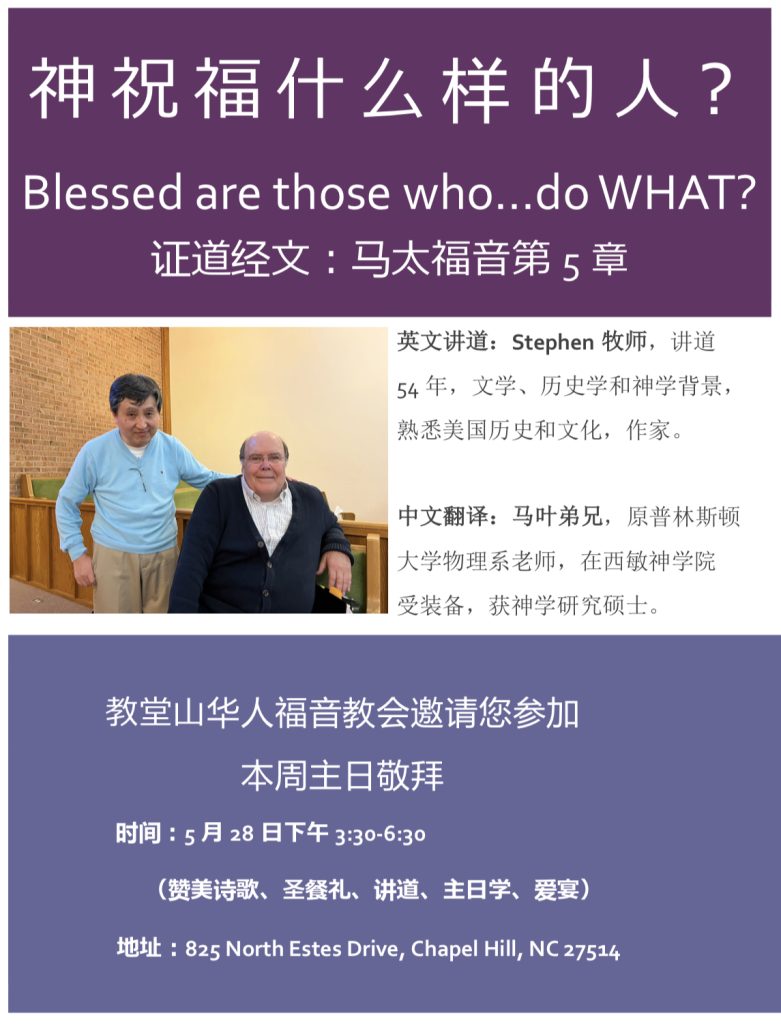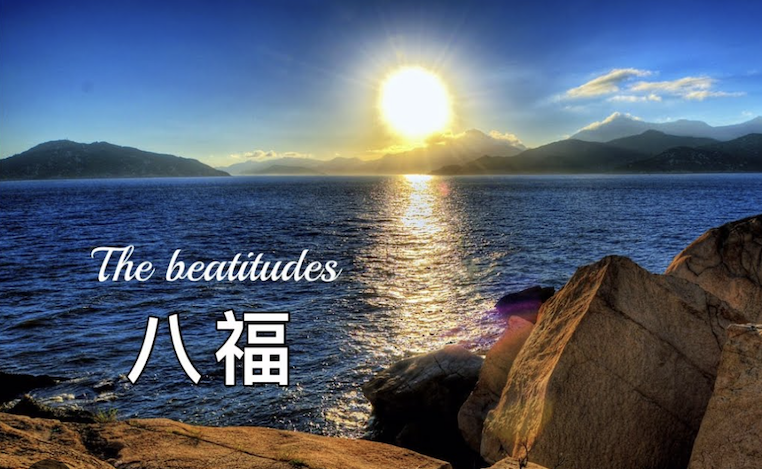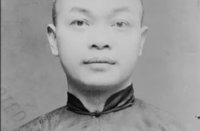文/教堂山华人福音教会Stephen牧师 译/教会同工
“灵里贫穷的人有福了,因为天国是他们的。”马太福音5:3
人们对我们基督徒最糟糕的批评可能是说:”我观察过你的生活,你和世界上其他人没有什么不同!你和我一样贪婪、恶毒、充满欲望!”
无可否认,有时来教会就像把小石子扔进湖里。鹅卵石的外表变得漂亮而湿润,但水从未渗透到里面。同样地,我们很容易来到教会,让福音冲刷我们的外在生活–我们的穿着、头发的剪裁、我们的言语,等等。但与此同时,我们的内在生活仍然被紧紧锁住,不让福音渗透进来。因此,我们的良心、精神、价值观和态度仍然不为真理所动! 我们有一个外在表现的宗教,但我们的生命没有改变。
缺乏渗透力的问题在《登山宝训》中表现得最为明显。奥利弗-温德尔-霍姆斯(Oliver Wendell Holmes)写道:”大多数人愿意把《登山宝训》当作一面旗帜来航行,但很少有人会把它当作掌管航行方向的舵。”
我们现在来看看耶稣的八福,这是祂最著名的布道中的第一段话。一共有八句。前四句是关于人与上帝的关系, 后面四句是关于人与人的关系。
让我们沉浸在耶稣的这八句话中的第一句。让我们向上帝的赐福打开我们的内心,在他里面得到满足。
有福的
首先,我们必须理解基督提出 “八福 “的公式。传统的英文圣经翻译为:”心灵贫穷的人是有福的,因为天国是他们的!” 但在希腊原文中没有 “是”。更好的翻译是:”哦,有福的灵里贫穷的人,因为天国是他们的!” 因此,第一节经文不是一个简单的陈述句,而是一个感叹句。它是一个感叹句,意在激动地呼喊! “哦,有福的灵里贫穷的人。. . !”
“有福的” 这个词在希腊文中是makarios。它与地中海上的塞浦路斯岛使用的是同一个词。塞浦路斯被称为 “快乐岛”。在基督的时代,它非常富裕,应有尽有。有句谚语说,一个人不需要越过塞浦路斯的海岸线就能找到人世间的所有快乐。因此,第一节的更恰当的翻译可能是: “哦,有福的灵里贫穷的人,因为天国是他们的!”
对我们现代人来说,幸福意味着感觉良好。”我和妻子相处得很好。孩子们很听话。我的投资去年达到12%。而且看起来我将在工作中获得晋升!” 你看到我们的幸福是如何建立在我们的环境之上的吗?这种幸福的问题在于它是如此脆弱。为什么,我的生活有90%的时间可以过得很好,但有10%的时间过得不好,就会破坏我的心情。
这不是基督说的那种幸福。主的福气或幸福不是你所感觉到的,而是实际的。不是暂时的东西,而是永恒的东西。不是你对我们环境的看法,而是神的看法。
希伯来语中的 “有福 “一词背后是这样一幅图像–那是一只跪着的骆驼。意思是说,骆驼跪着,以便装上丝绸、香料、财宝等,然后站起来,加入商队,把货物带到遥远的地方。
这就是诗篇68:19中的图像。”那每日用利益装载(或祝福)我们的主有福了”。
因此,这个意思是,骆驼被做成 “沙漠中的船”。那么,受祝福就是要像骆驼一样,做上帝让我们在这里做的事情。
现在,回到第一节的内容。”啊,有福了,幸福的岛民,啊,装载财宝的骆驼,啊,那些幸福地满足于上帝的人……” 因此,我们在上帝那里的幸福不是一种感觉,而是一种持久的满足,不是我们对环境的看法,而是上帝的看法。
这就是耶稣提出祂的圣训的公式,第一,一个满足的态度。
灵里的贫穷
“哦,有福的灵里贫穷的人,因为天国是他们的!”
你是否记得,前四节与一个人与上帝的关系有关?因此,拥有一种精神(灵)上的贫困态度是基督敦促祂的门徒的第一个原则。
这让许多基督徒感到困惑。基督是在颂扬贫穷吗?是的,祂是。但这不是物质上的贫穷–缺乏食物和住所。相反,基督特别指出的是”精神(灵)上的贫穷”。
在希腊语中,”精神(灵)上的贫穷 “意味着赤贫,没有资源,简直是被打倒在地–如此贫穷,只能向神寻求安慰。因此,第一节的直译是:”意识到自己精神(灵)上完全贫穷并把所有的信任放在上帝身上的人是多么幸福啊,因为祂的天国就是这样。
在路加福音18:9(及以下),耶稣讲述了两个人进殿祷告的比喻。第一个人很有钱,很骄傲,很自以为是。他是一个法利赛人。他站在圣殿中最显眼的地方,像孔雀一样趾高气扬!耶稣说他 “是在向自己祷告”。他不是在与上帝对话,而是沉浸在一种自我安慰的内心对话中。”我感谢你,天主,我不像其他人–通奸者、说谎者和盗贼。我每天祷告五次,禁食,并做十一奉献。”
第二个人,一个被社会鄙视的税吏,躲在圣殿的阴影里。他甚至不愿意举目望天!而是捶胸顿足,痛苦不堪!相反,他捶胸顿足,痛苦地祈祷:”主啊,怜悯我这个罪人吧!”
我想说的是,第一个人看自己,看邻居,而不看上帝。而第二个人则是看自己,看上帝。在将自己的性格与上帝的本性相比较时,他感到了自己的贫穷和谦卑。
我们在北卡罗来纳州有一句话–“高而干枯”。它被翻译成这一属灵真理:在自我上高高在上,在精神(灵)上干巴巴;在骄傲上高高在上,在上帝眼中为低;在自我上高高在上,在精神和灵魂上萎缩和干瘪’。
你想要一个这样的例子吗?启示录3:17(及以下)描述了老底嘉的教会在教育、物质和社会地位方面非常富有,但在圣灵的事情上却非常贫乏。你们说:”我是富足的,我已经得了财富,什么都不需要。“但你们没有意识到你们是可怜的、可悲的、贫穷的、瞎眼的、赤身的。你有了, 但又高又干。我们越是自以为是,就越远离神。
我们可以知道我们在灵性上成长的一种方式是当我们变得更加加尔文主义。我的意思是,当我们对神有更高的看法,对自我有更低的看法;对神的主权有更高的认识;对自己的计划有更低的认识,上帝的荣耀成为一切, 我自己的荣耀变得微不足道。我变得更关心自己的忠诚,而不是自己的果实。或者说,简而言之,我变得相信自己的极度贫穷,但也意识到上帝的惊人财富。
正如赞美诗作者所说:”我手里没有东西,只是紧紧抓住十字架”。
耶稣说,门徒们与上帝的关系是从意识到自己和上帝没有这种关系开始的。并从那里继续下去,不断加深对只有上帝是伟大的理解。我什么都不是。上帝是富有的,我是贫穷的。
在此研究使徒保罗是有帮助的。当我们在圣经中第一次见到他时,他是一个宗教法利赛人,在公众面前趾高气扬,自以为是。然后他遇到了耶稣,很快就对自己不感兴趣了,同时被神的荣耀所征服。
公元58年,他写道:”做使徒的保罗——不是由于人,也不是借着人,乃是借着耶稣基督,与叫他从死里复活的父神”(加拉太书1:1)。
公元63年,他写道: “基督耶稣降世,为要拯救罪人。这话是可信的,是十分可佩服的。在罪人中我是个罪魁!”。注意保罗没有说 “我(过去)是罪人之首”。保罗说,”我(一直)是罪人之首”,精神(灵)上是贫穷的。
我们越是接近神,他的恩典就越是惊人。我们越是认识到他的一切,我们就越是认识到我们的一切不是。”我手中没有任何东西,我只是紧紧抓住十字架!” 哦,主啊,这一切都取决于祢!
结论
也许你们中间有一个人在读这篇文章时,他不知道这样的真理。你曾试图通过自己的工作来建立你与神的关系,你已经成为虔诚的教徒。在遵守规则的过程中,你认为你会赢得回到上帝身边的方式。现在你认为自己比别人好。然而,实际上在内心深处,你是疲惫的,艰难的,没有快乐的。
你只顾自己,只顾邻居,不顾上帝。而且你是不义的。
好消息! “哦,有福的灵里贫穷的人,因为天国是他们的!”
也许今天你会看着上帝的光辉,发现你自己的不堪。然后像骆驼一样跪下来,请求上帝用他丰富的恩典来充满你。
建议的祷告
主啊,请怜悯我,我是一个罪人。奉主耶稣的名,阿们!
(根据Stephen牧师5/21/2023在教堂山华人福音教会的讲道翻译整理。后附英文原文。)
如果您看了《葡萄树》刊载的文章,有兴趣了解我们的信仰,请不要消灭这份感动,可以添加和和的微信号,与我们联系。

教堂山华人福音教会已恢复每周日线下实体主日敬拜
时间:每周日下午3:30-6:30(诗歌-证道-主日学-爱宴)
地址:825 N Estes Drive, Chapel Hill, NC 27514

UNC学人之家团契已恢复每周五线下实体聚会
时间:每周五晚上6:30-9:00(晚餐-诗歌-查经)
地址:150 E Franklin Street, Chapel Hill, NC 27514
Blessed are the poor in spirit, for theirs is the kingdom of heaven. Matthew 5:3
Possibly the worst criticism anyone can level at us Christians is to say, “I’ve watched your life and you’re no different than the rest of the world! You’re just as greedy, malicious and full of lust as I am!”
Admittedly, sometimes coming to church is like tossing a pebble into a lake. The pebble gets nice and wet on the outside, but the water never penetrates to the inside. Similarly, it’s easy to come to church and allow the externals of the gospel to wash over our outer lives— how we dress, the cut of our hair, our speech, and so forth. But all the while our inner life remains locked up tightly against any penetration by the gospel. So our conscience, our spirit, our values and our attitudes remain unfazed by truth! And we have a religion of outward show, but it’s not life-changing.
Nowhere is the gospel’s lack of penetration more evident than in the Sermon on the Mount. Oliver Wendell Holmes wrote, “Most people are willing to take the Sermon on the Mount as a flag to sail under, but few will use it as a rudder by which to steer.”
We come now to the Beatitudes of Jesus, the first words of his most famous sermon. There are eight beatitudes in all. The first four deal with one’s relationship with God. The last four deal with one’s relationship with people.
Let’s immerse ourselves in the first of these eight pronouncements of Jesus. Let’s open our inner attitudes to God’s beatitudes and find fulfillment in him.
Blessed
First, it is imperative that we understand the formula in which Christ presented the Beatitudes. The traditional English Bible translation reads, “Blessed are the poor in spirit, for theirs is the kingdom of heaven!” But there is no “are” in the Greek original. A better translation is: “O the blessedness of the poor in spirit, for theirs is the kingdom of heaven!” Thus the first beatitude is not a simple declarative sentence, but an exclamation. It is an exclamatory remark meant to be shouted with excitement! “O THE BLESSEDNESS OF THE POOR IN SPIRIT . . . !”
The word blessed is the word makarios in the Greek. It’s the same word used for the island of Cyprus in the Mediterranean. Cyprus is known as “the Happy Island.” It had it all in Christ’s day. The saying was that a person need not go beyond its coastline to find joy. So a fair translation of the first beatitude might be: “O the happiness of the poor in spirit, for theirs is the kingdom of heaven!”
To us moderns happiness means feeling fine. “The wife and I are getting along. The kids are behaving. My investments hit 12 percent last year. And it looks like I’ll get that promotion at work!” Do you see how we base our happiness on our circumstances? The trouble with such happiness is that it is so fragile. Why, 90 percent of my life can be going just fine, but 10 percent going poorly can destroy my mood.’
This is not the sort of happiness Christ is talking about. The Lord’s blessedness or happiness is not what you feel, but what is. Not what is temporary, but what is eternal. Not what you think of our circumstances, but what God thinks.
The Hebrew word for blessed has a word picture behind it— that of a kneeling camel. The idea is that a camel kneels so it can be loaded with silks, spices, treasure and such, then gets up and joins a caravan taking its cargo to distant lands.
This is the picture in Psalm 68:19. “Blessed be the Lord who daily loadeth (or blesses) us with benefits.”
So the idea is that a camel is made to be “a ship of the desert.” To be blessed, then, is to be like a camel, to be doing that which God put us here to do.
Now, back to the first beatitude. “O the blessedness, of the happy islanders, O the loaded camels carrying treasure, O those happily fulfilled of God . . .” Thus our happiness in God is not a feeling but an abiding fulfillment, not what we think of our circumstances, but what God thinks.
That is the formula in which Jesus presented his beatitudes. Now, this: the first fulfilling attitude.
Poor in Spirit
“O the blessedness of the poor in spirit, for theirs is the kingdom of heaven!”
Do you remember that the first four beatitudes have to do with one’s relationship with God? Thus, having an attitude of spiritual poverty is the first principle Christ urges upon his disciples.
This has confused many Christians. Is Christ glorifying poverty? Yes, he is. But it is not physical poverty— lack of food and shelter. Rather, it is spiritual poverty— “poorness in spirit” that Christ is singling out.
In the Greek, “poor in spirit” means abject poverty, without resources, literally beaten to your knees— being so poor one can only look to God for solace. Thus a literal translation of the first beatitude reads, “O the happiness of the person who realized his complete spiritual poverty and puts all his trust in God, for his is the kingdom of heaven.”
In Luke 18:9 (and following), Jesus told the parable of two men who went into the temple to pray. The first man was rich, proud, and self-righteous. He was a Pharisee. He stood in the most prominent place in the temple and preened like a peacock! Jesus said he “prayed thus with himself.” He was not talking to God, but indulging in a kind of inner dialogue of self-congratulation. “I thank thee, Lord of heaven, that I am not like other men— adulterers, liars and thieves. I pray five times a day, fast and tithe.”
The second man, a socially despised tax collector, hid in the shadows of the temple. He wouldn’t even lift up his eyes to heaven! Rather he beat his breast and anguished in prayer, “Lord, have mercy on me, a sinner!”
I like to say the first man had one eye on himself, one eye on his neighbor, and no eye on God. The second man, however, had one eye on himself, and one eye on God. And in comparing his character with the nature of God, he came away feeling poor and humble.
Jesus said the poor man went down to his house “justified,” while the proud man went away “unjustified.”
We’ve a saying here in North Carolina– “high and dry.” And it translates into this spiritual truth: high in ego, dry spiritually; high in pride, low with God; high in self, shriveled and dry in spirit and soul.’
Do you want an example of this? Revelation 3:17 (and following) describes the church at Laodicia as very wealthy in education, material things and social status, but very impoverished in the things of the Spirit. “You say, “I am rich; I have acquired wealth and do not need a thing.’ But you do not realize that you are wretched, pitiful, poor, blind, and naked.” There you have it. High and dry. The more self-righteous we are, the less God-conscious we are.
One way we can tell we’re growing spiritually is when we get more Calvinistic. By that I mean when we have a higher view of God and a lower view of self; a higher sense of God’s sovereignty; a lower sense of one’s own plans. God’s glory becomes everything. My own glory becomes marginal. I become more concerned with being faithful than with being fruitful. Or, in short, I become convinced of my own utter poverty and yet become aware of God’s incredible riches.
As the hymn writer puts it, “Nothing in my hand I bring, simply to the cross I cling.”
Jesus is saying that the disciples’ relationship with God begins with a realization that there isn’t one. And it continues from there with an ever deepening understanding that only God is great. I am nothing. God is rich. I am poor.
It is helpful to study the apostle Paul here. When we first meet him in Scripture he is a religious Pharisee strutting and preening himself in public, crowing self-righteously. Then he meets Jesus and quickly becomes singularly unimpressed with himself, while becoming overwhelmed with God’s glory.
In A.D. 58, he writes, “Paul an apostle– not from men nor through man, but through Jesus Christ” (Galatians 1:1).
In A.D. 63 he writes, “The saying is sure, and worthy of full acceptance, that Christ Jesus came into the world to save sinners. And I am the chief of sinners. Note Paul did not say “I was the chief of sinners.” Poor in spirit, Paul says, “I am the chief of sinners.”
The closer we get to God the more amazing his grace is. The more we realize all he is, the more we recognize all we are not. “Nothing in my hand I bring, simply to the cross I cling!” Oh, Lord, it all depends on you!
Conclusion
Perhaps there is one of you reading this who has not known such truth. You have tried to establish your relationship with God by your own works. You’ve become devoutly religious. In the observance of rules you think you will earn your way back to God. Now you think you are better than others. Yet really on the inside you are tired, hard and joyless.
You have one eye on yourself, one eye on your neighbor and no eye on God. And you are unjustified.
Good news! “O the blessedness of those who realize their complete spiritual poverty with God, theirs is the kingdom of God!”
Perhaps today you would look into the splendor of God and find your own raggedness. And kneeling like a camel, you’d ask God to load you with his rich grace.
Suggested Prayer
Lord, have mercy on me, a sinner. For Jesus’ sake. Amen.










